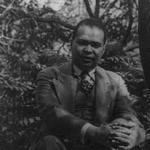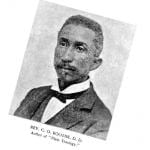 Thomas Dixon wrote a series of racist books so terrible Woodrow Wilson liked them and Hollywood made Birth of a Nation to monetize their lies. This confirms two rules of thumb: progressive cant does not cancel racism and Hollywood will do anything for money. The books, consider the title Leapord’s Spots, were a cry for race purity against “miscegenation.” White Southern folk did eugenics first.
Thomas Dixon wrote a series of racist books so terrible Woodrow Wilson liked them and Hollywood made Birth of a Nation to monetize their lies. This confirms two rules of thumb: progressive cant does not cancel racism and Hollywood will do anything for money. The books, consider the title Leapord’s Spots, were a cry for race purity against “miscegenation.” White Southern folk did eugenics first.
Racist.
Ugly.
Arguing for Confederate nostalgia.
Thomas Dixon attacked the very beauty of the African-American body and the ability of the African-American mind.
He wrote, he hated, and seemingly conquered.
One man without Dixon’s connections, resources, or hate decided to take on the task of telling a different story. Dixon presented African-Americans propped up by Northern bayonets and controlled by carpet bagging whites. Thomas Dixon twisted Christian theology to justify hate. Sutton Griggs wrote a novel, The Hindered Hand, to counter-act the lies.
If I had the money, I have friends (and a daughter!) who should make the movie. Sutton Griggs knew the black body is beautiful, created in the image of God.
The young woman looked up from her breakfast. “My!” she said, “Your eyes are pretty. They are such a lovely brown.
Sutton Griggs lived in corrupt, Boss Hogg South, where the hard working hand of the African-American was hindered and then blamed for not doing enough. “Lazy,” they cried, “while denying work.”
At one time the Negroes of the cities of the South had almost a monopoly of the work of transferring passengers and baggage to and from the depots, but white men organized transfer companies, placed white agents on the incoming trains to solicit patronage, employed white men to drive the transfer wagons and thus largely wrested the business from the hands of the Negroes. But the Negroes would yet drive up to the station, hoping for some measure of success in the spirited contests that would arise in attempts to capture such gleanings as the advance agents of the transfer companies had left behind.
Sutton Griggs spoke the truth and (mostly) was ignored, but Griggs created a publishing house and wrote novel after novel. They are (if you like early 1900’s novels as I do) excellent quick reads with the bonus of being lived history. He describes what is around him and that was enough to engender hatred in the Ivy League, the business elite, the Democrats, and the Lilly White Republicans that had purged the party of any trace of the abolitionist past.
Griggs pictures brave veterans who fought for our flag given less honor than traitors who tore down Old Glory, because the veterans were black and the rebels were white. He did not have to say it, just picture the truth of the Wilson era: better to spit on Old Glory, than to bleed red, white, and blue if the skin pricked is black. He was, certainly, less of a novelist than Dixon, less sure in his story telling, because the truth was so overwhelming.
The prophet Jeremiah would have struggled to be a novelist, but it was novelists that were penetrating the public, so Griggs took on the task of telling tales while telling the truth. His novels, unlike Dixons’s, struggle to maintain a plot, because they are so full of passion. See Judge Lynch in action and it is hard to slow dow.
Dixon played up fear. Griggs loved. Both were Baptist pastors, but one was a Christian.
Griggs describes a society where an African-American is better off “confessing” to a crime he did not commit than to face a jury. The judge might, just might, give justice, but if he is acquitted, the lynch mob will end his life. Guilty he goes to prison, where he might live. Innocent and he will die.
If you are my age and African-American, your grandparents lived this world. This is not long ago and justice still has not been done. How can you know? Dixon’s lies live in Gone with the Wind and Griggs remains unshot, unscripted, unknown.
Read the novel that tells the truth and ask somebody to make the film.












